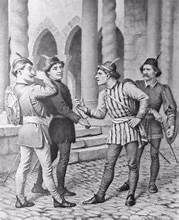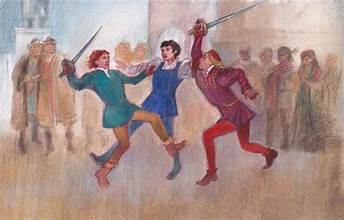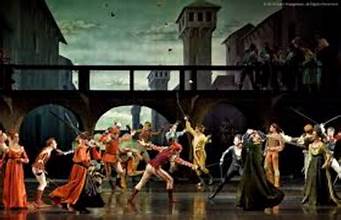The tragic fate of Romeo and Juliet is one of the most well-known and heartbreaking stories in literature. It serves as a powerful reminder of how long-standing conflicts, pride, how do the Montague and Capulet families contribute to the catastrophe in Romeo and Juliet and hatred can destroy lives. In William Shakespeare’s Romeo and Juliet, the Montague and Capulet families play a crucial role in driving the narrative toward its devastating conclusion. By exploring the dynamics between these two feuding families, we can better understand how their actions and attitudes directly contribute to the catastrophe that unfolds. In this article, we will delve into how do the Montague and Capulet families contribute to the catastrophe in Romeo and Juliet, examining key moments, characters, and decisions that precipitate the tragic ending of the play.
Table of Contents
Introduction to the Feud Between the Montagues and Capulets
At the heart of Romeo and Juliet lies the bitter feud between the Montague and Capulet families. This feud is so deep-rooted that it has persisted for generations, and its origins are never fully explained in the play. Shakespeare does not elaborate on the reasons for the families’ enmity, but he uses their longstanding hatred as a catalyst for the tragic events that unfold. From the opening scene, we witness the extreme violence between the two families, setting the tone for the entire play.
The introduction of the families’ rivalry is immediate and stark. In Act 1, Scene 1, a street brawl between the Montagues and Capulets erupts, instigated by the actions of their servants. This public display of violence not only serves to demonstrate the depth of the feud but also shows that the hatred between the families is all-encompassing, involving even the most mundane and minor characters. This relentless conflict would be the driving force that leads to how do the Montague and Capulet families contribute to the catastrophe in Romeo and Juliet?
The Role of Lord Capulet and Lord Montague

Lord Capulet and Lord Montague, as the patriarchs of their respective families, bear significant responsibility for the feud that divides Verona. how do the Montague and Capulet families contribute to the catastrophe in Romeo and Juliet Their inability to resolve their differences and their prideful commitment to the feud contribute significantly to the events that unfold. The conflict between the two families is perpetuated by these two men, who could have made peace but instead choose to escalate the conflict.
Lord Capulet’s role in the tragedy is particularly evident when he arranges the marriage of Juliet to Paris. He insists that Juliet, still a young girl, marry Paris, despite her protests. This decision stems from his desire to maintain the family’s honor and status, but it directly leads to Juliet’s desperation and, ultimately, her tragic end. Similarly, Lord Montague’s reaction to the feud, while not as overtly controlling as Capulet’s, reveals his own pride and unwillingness to let go of the animosity that defines his relationship with the Capulets. How do the Montague and Capulet families contribute to the catastrophe in Romeo and Juliet? Their insistence on maintaining the feud blinds them to the consequences of their actions, particularly when their children’s lives are involved.
The Impact of the Families’ Servants
While the primary figures in the drama are Romeo and Juliet, how do the Montague and Capulet families contribute to the catastrophe in Romeo and Juliet the servants of the Montagues and Capulets also play an integral role in escalating the conflict. In the opening scene, we see Sampson and Gregory, two Capulet servants, provoke Abraham and Balthasar, the Montague servants, leading to a street fight. This fight sets the stage for the violence that will permeate the entire play. how do the Montague and Capulet families contribute to the catastrophe in Romeo and Juliet Even though these characters are not central to the main plot, their actions provide a microcosm of the ongoing hostilities between the families.
The minor roles of the servants emphasize that the feud is all-encompassing, affecting not just the heads of the families but also those who serve them. The actions of the servants can be seen as a reflection of the larger conflict between the Montagues and Capulets. The aggression of the servants is also mirrored by the actions of their masters, suggesting that the feud has permeated every aspect of life in Verona. In this way, the behavior of the servants directly contributes to how do the Montague and Capulet families contribute to the catastrophe in Romeo and Juliet?
Romeo and Juliet: The Innocent Victims of the Feud

At the heart of the tragedy are Romeo and Juliet, two young lovers who are forced to navigate the destructive and relentless animosity of their families. Their love is pure and innocent, but it is overshadowed by the bitter conflict that defines their families. From the moment they meet, their relationship is doomed by the circumstances of their birth. how do the Montague and Capulet families contribute to the catastrophe in Romeo and Juliet The fact that Romeo is a Montague and Juliet is a Capulet makes their love forbidden, and this cultural norm contributes to the tragedy of the play.
Romeo and Juliet are not the architects of their own downfall but rather innocent victims caught in the web of their families’ hatred. In Act 1, Scene 5, when Romeo and Juliet meet at the Capulet ball, they are unaware of each other’s identities. However, once they discover that they belong to feuding families, their love is immediately fraught with danger. how do the Montague and Capulet families contribute to the catastrophe in Romeo and Juliet This moment marks the beginning of the doomed love affair, and their inability to escape the constraints imposed by their families ultimately leads to their demise.
Throughout the play, Romeo and Juliet make several attempts to defy their families and be together, but the forces working against them are insurmountable. how do the Montague and Capulet families contribute to the catastrophe in Romeo and Juliet Their secret marriage, arranged by Friar Laurence, is a symbol of their desire to unite despite the feud, but it only leads to further tragedy. The escalating tension between the families creates an environment in which Romeo and Juliet’s love is impossible to sustain.
Tybalt’s Role in Escalating the Conflict
One of the most significant contributors to the tragedy is Tybalt, Juliet’s cousin. Tybalt embodies the Capulet family’s aggression and hatred toward the Montagues, and his impulsive actions serve as a key turning point in the story. how do the Montague and Capulet families contribute to the catastrophe in Romeo and Juliet His violent nature is revealed early in the play when he challenges Romeo to a duel after Romeo attends the Capulet ball. Romeo, who is now secretly married to Juliet, refuses to fight Tybalt, which only serves to intensify Tybalt’s anger.
Tybalt’s role becomes even more critical after he kills Mercutio, Romeo’s close friend. In a fit of rage, Tybalt kills Mercutio, and this event triggers Romeo’s decision to avenge his friend’s death. In doing so, Romeo kills Tybalt, leading to his banishment from Verona. Tybalt’s reckless violence not only fuels the escalating conflict between the families but also directly influences the chain of events that leads to the tragic conclusion of the play. How do the Montague and Capulet families contribute to the catastrophe in Romeo and Juliet? Tybalt’s actions amplify the enmity between the families and ensure that the tragedy continues to spiral out of control.
The Role of Fate and Miscommunication
While the actions of the Montagues and Capulets contribute significantly to the tragedy, it is also important to consider the role of fate and miscommunication in the catastrophe. Shakespeare’s play suggests that the lovers are doomed from the start, how do the Montague and Capulet families contribute to the catastrophe in Romeo and Juliet and much of their downfall is due to a series of unfortunate events and misunderstandings.
The failure of the letter from Friar Laurence to reach Romeo is a prime example of how miscommunication plays a pivotal role in the catastrophe. Romeo, unaware of Juliet’s feigned death, believes she is truly gone and takes his own life. Juliet, upon awakening and discovering Romeo’s death, takes her life as well. This final act of tragedy is a direct result of the inability to communicate effectively, something that could have been avoided if the families were not so preoccupied with their feud.
Also read Plessner Coaching in Lutherstraße 2 34327 Körle: A Transformative Coaching Experience
Conclusion
In the end, the Montague and Capulet families contribute significantly to the catastrophe in Romeo and Juliet. Their longstanding feud, pride, and aggressive actions directly lead to the tragic deaths of their children. The hostility between the families creates an environment where love cannot flourish and where violence becomes an inevitable response to even the most innocent of acts. How do the Montague and Capulet families contribute to the catastrophe in Romeo and Juliet? The answer lies in their refusal to reconcile their differences, their encouragement of violence, and their blindness to the destruction their feud causes. Through their actions, Shakespeare demonstrates the destructive power of hatred and pride and the consequences that arise when individuals are unable to break free from the constraints of familial loyalty and social expectations. Ultimately, the tragedy of Romeo and Juliet serves as a timeless warning about the dangers of division and intolerance.


